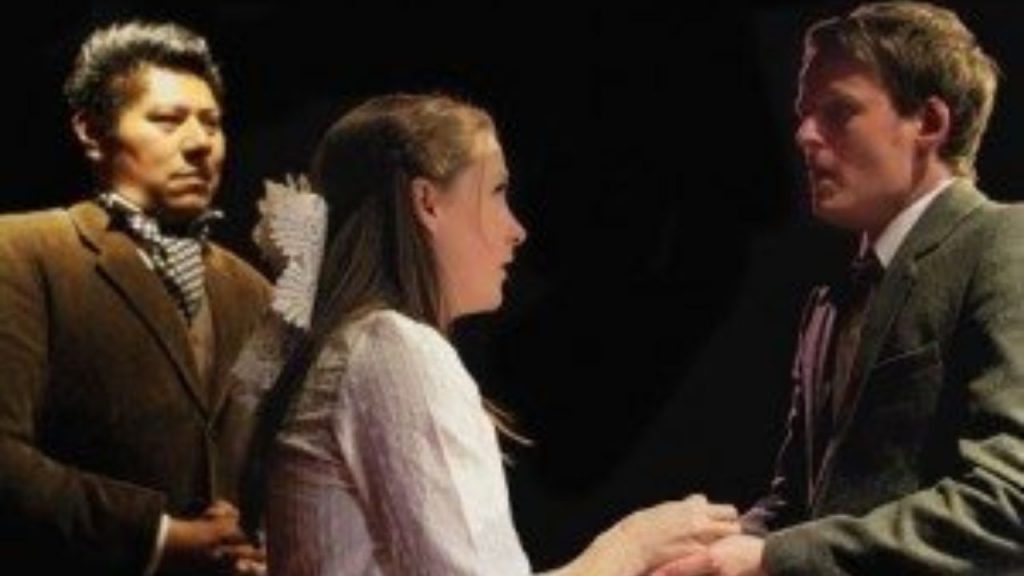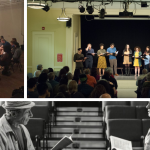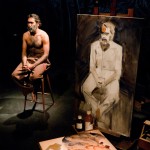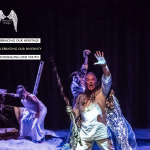75 years of success for Thornton Wilder’s Our Town at the King’s Head Theatre
“Did you know that Our Town is the most performed play in the world after Shakespeare, with a performance of the play running every night in the United States since its premiere in 1938? Over 300,000 performances!” Artistic Director Adam Spreadbury-Maher, at the opening of King’s Head Theatre’s 75th Anniversary Production of Wilder’s Our Town.
Sunday 30th June 2013
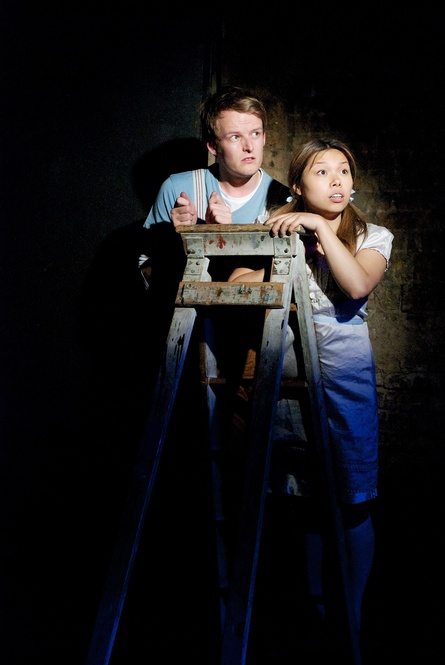
Thornton Wilder’s Our Town begins with the Stage Manager introducing Grover’s Corner, and the audience, seated on three sides of the King’s Head Theatre’s intimate space, start to become acquainted with Wilder’s New Hampshire landscape: the houses, shops and streets of families, which he points out, who have their names etched in perpetuity on the tombstones of the graveyard on the hill. The drama of the inevitable movement of mortality leading lives towards that unavoidable end has started.
From my seat, I notice how Wilder’s play is drawn up metaphorically all around the audience and they occupy its terrain of vegetable gardens, chicken coops, family breakfasts and intimate conversations. Why does this play, after seventy-five years, still carry a punch?
Firstly, you are immediately engaged with the quality of Wilder’s language, which, like Shakespeare’s, has the familiar ring of everyday speech, combined with the beauty of a mellifluous rhythm. While it isn’t “poetic drama”, the rich imagery of its easy, storytelling style lifts Our Town to a level of universal importance.
The structure of its three acts weaves together a story for our time: one which we are only too familiar with, of life at the beginning of a new century faced with the technological transformation of everything before us. Like the inhabitants of Grover’s Corner, we hold onto daily rituals and important ceremonies around family, children, marriage and funerals. However, the irony of knowing that, in 1938, Wilder’s references to the destruction of World War One about to hit the lives of the citizens of Grover’s Corner may seem strangely innocent to audiences in 2013, who know about the many more killing fields added to human history because of World War Two and other more localised wars such as Vietnam and Afghanistan.
Rising above or being pulled down by time and circumstance is the drama of Our Town. Wilder’s New England characters express all humanity as they deal with their unrealised abilities as either thinkers or doers: the central roles of Emily Webb and George Gibbs are iconic as Emily’s cleverness remains as unrealised as George’s promise of becoming a baseball star. Instead of these achievements, the childhood sweethearts, who go on to marry, are like everyone else in Grover’s Corner. Despite opportunities to the contrary, they choose to stay put in their small town. However, this choice, Wilder shows, is no protection from risk, pain or untimely death.
For me, the outstanding performance of the night goes to Zoe Swenson-Graham in her portrayal of Emily Webb. The intelligence of her artistic decisions to deal with Emily as both the “clever child” and the young woman who knows she will amount to nothing if, in “our town,” she is not loved and supported by a husband unfolds poignantly and dynamically. Other impressive performances are also those of Rita Walters and Tamarin McGinley, who play the two mothers of the neighbouring Webb and Gibbs families. Walters brings an earthiness and strength to the role of Mrs Webb, while McGinley portrays Mrs Gibbs as wistful and fragile.
Director Tim Sullivan assembles a cast from the four corners of the world for the production: South America, New Zealand, Australia, South Africa, Hong Kong and from different parts of the UK and Europe. There is no note by him in the program to say if, for instance, this was deliberate to heighten Wilder’s metatheatrical style. On the other had, the ethnically mixed cast, to my mind, clearly disrupts the audience’s ability to view actors portraying the roles naturalistically.
Arguably, while this might work visually, the director’s choice not to portray the characters through the use of an American accent seems to diminish the play’s intensity. Put simply, listening to the many accents in the production felt like being distracted from hearing about life in Grover’s Corner. This particularly weakens the role of the Stage Manager, who comes to appear in the production more and more like a wanderer who has no particular connection with Grover’s Corner at all.
Nonetheless, the production grips you in the end, if only by watching Swenson-Graham’s portrayal of Emily as she builds the role into its full sense of tragic heroism as she faces up to her short life in the face of eternity. Such a realisation of how momentarily life is experienced brings almost unbearable pain, which ends mercifully when the Stage Manager informs the audience that the play is ended and we can return, necessarily, to get on with our own small ignoble lives.
Date reviewed: Friday, 28th June 2013
